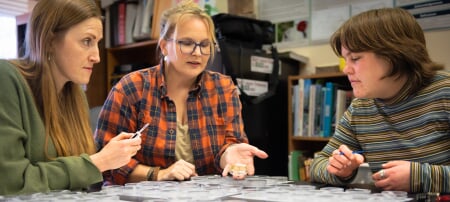Amy Marcarelli Receives NSF CAREER Award

Research indicates human activities have altered the global nitrogen cycle as much or more than the global carbon cycle. Yet it seems the public is far less aware of these changes.
In the world of aquatic biology, it’s a long-held belief that what goes up, must come down. As human activity causes nitrogen loads to go up along the banks of rivers and streams, nitrogen levels go down through another process. Amy Marcarelli, a Michigan Technological University associate professor in biological sciences, has received a CAREER Award from the National Science Foundation (NSF) to study this nitrogen conversion balance.
She’s looking at two biological processes: nitrogen fixation and denitrification. Nitrogen fixation is sort of like a magic show where microbes take nitrogen out of thin air, turning it into a usable form for all organisms. The trick is in the biogeochemical process, which partitions and cycles chemical elements and compounds between the living and nonliving parts of an ecosystem. The process is more or less reversed in denitrification, with the gases released into the atmosphere. The result should be a net reduction in nitrogen loads in rivers and streams. Although nitrogen fixation could offset nitrogen losses from denitrification, we know little about where and when it occurs in streams and rivers, and how it responds to human activities.
Marcarelli is looking to apply updated analytical techniques and models to test alternative hypotheses regarding how the balance between nitrogen fixation and denitrification influences nitrogen loads in streams and rivers.
With funding from the CAREER award, Marcarelli and her team will help create more accurate nitrogen budgets and models which are needed to better understand and manage the human effects on nitrogen cycling at both regional and global scales.
The CAREER awards are prestigious grants from the NSF to young faculty who effectively integrate research and teaching. Marcarelli was awarded a 5-year, $794,661 grant to continue her research into nitrogen fixation and denitrification.
Not only will her research look to affirm, or disprove, long-held beliefs, but also to create a more ecologically-savvy citizenry by integrating ecosystem ecology techniques into K-12 and undergraduate education.
Research
The goal of the CAREER-funded plan, according to Marcarelli, is to address two shortcomings of the accepted understanding and instruction of aquatic ecosystem ecology. “We want to evaluate a fundamental disconnect between our conceptualization of the role of nitrogen fixation in rivers,” Marcarelli explains. “Secondly, we want to integrate the nitrogen and other biogeochemical cycles into instruction of undergraduate ecology.”
Marcarelli says she plans to use both traditional and updated techniques and open-water stream models. “We want to ask some fundamental questions; Do nitrogen fixation and denitrification co-exist in streams across a natural range of reactive nitrogen concentrations? Do ‘hot spots’ and ‘hot moments’ facilitate this co-existence? And do increasing nutrient loads shift the balance to favor losses via denitrification, as has long been assumed in studies of rivers?”
Through the CAREER plan, she proposes to utilize what she calls "a continental-scale observational gradient approach" and experimental manipulations to address these fundamental questions.
“We’ll harness the National Ecological Observatory Network to provide a framework for these studies, facilitated by the construction of a mobile analytical lab.” Marcarelli says.
Education
The construction and operation of a mobile lab is a key part of both the research and educational components of the CAREER project. Marcarelli says accurate rates of nitrogen fixation and denitrification using common assays are dependent on accurate estimates of gas concentrations.
“These estimates are best achieved when samples can be held under stable conditions and analyzed as quickly as possible,” she explains.
In the past she has conducted testing in remote locations and stored gas samples in containers.
“Stored samples are prone to leakage during transportation, particularly when the collection elevation and temperature differ largely from that where the samples will be analyzed,” she points out.
Marcarelli says her research team is likely to encounter these problems while conducting fieldwork for the three research elements of her CAREER research. “Setting up a working lab in every location to be visited across the country, would make moving rapidly among field sites challenging, to say the least,” she explains.
The team will construct a mobile analytical lab as a novel and cost-effective solution to these problems. The mobile lab will have a small van as a base and be designed and outfitted with a safe and comfortable interior. There will be two workstations and a bunk suitable for one adult.
“I will partner with a College of Engineering Senior Capstone Design team based in Mechanical Engineering at Michigan Tech to complete this project,” Marcarelli says.
The mobile lab will also play a key role in the educational component of Marcarelli's CAREER project.
The two-phase education plan will use the mobile lab to integrate ecosystem approaches into ecology laboratory courses and build connections with engineering students at Michigan Tech. In addition, the education component aims to expose undergraduate and K-12 students to ecosystem research via hands-on and web-based experiences facilitated by the mobile lab.
“To reach local (K-12) students, I will identify several classes where teachers are interested in introducing their students to field-based ecology. Before our departure, we will visit these students in their classrooms to introduce ourselves and our project,” Marcarelli says.
She plans to work with Joan Chadde, educational program coordinator at Michigan Tech's Western Upper Peninsula Center for Science Mathematics and Environmental Education.
The mobile lab will also go on school visits so students can see the equipment that will be used during research. While conducting fieldwork, the researchers will post blogs several times per week, so students can follow the research and travel progress.
C.P. Joshi, chair of Tech’s Department of Biological Sciences, calls Marcarelli’s award a phenomenal achievement. “This is a highly-prestigious award and the first CAREER award in the history of Michigan Tech’s Biological Sciences Department, as far as I know,” he says. Joshi hopes the award is a sign of things to come. “We are looking forward to getting many more awards like this in our department.”
Marcarelli says the location and environment at Michigan Tech will foster the broader impacts of both the research and educational components of the CAREER plan.
“Because Michigan Tech is a STEM-dominant, high-research university located on the Keweenaw Peninsula, one of the most economically depressed regions of the country, the education and outreach components will have important broader impacts in an economically-impacted region.”
Michigan Technological University is an R1 public research university founded in 1885 in Houghton, and is home to nearly 7,500 students from more than 60 countries around the world. Consistently ranked among the best universities in the country for return on investment, Michigan's flagship technological university offers more than 185 undergraduate and graduate degree programs in science and technology, engineering, computing, forestry, business, health professions, humanities, mathematics, social sciences, and the arts. The rural campus is situated just miles from Lake Superior in Michigan's Upper Peninsula, offering year-round opportunities for outdoor adventure.




Comments